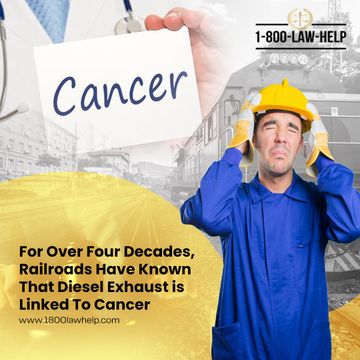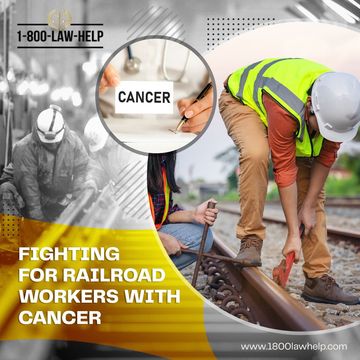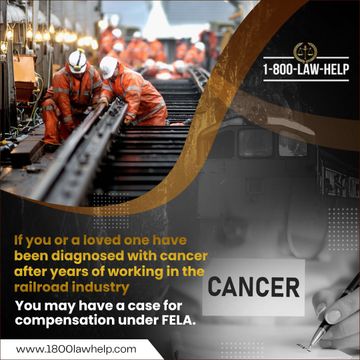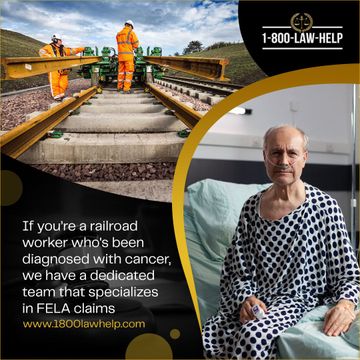
RAILROAD WORKERS
Being injured while working for the railroad creates a different scenario than a standard workers' compensation injury claim.
Railroad workers face many dangers on the job due to unsafe work conditions. One of the most common types of exposure that railroad workers face is exposure to high amounts of carcinogenic substances, such as benzene, creosote, and asbestos, which can cause cancer or develop into another type of serious illness.
If you or someone you know have suffered an injury while working in the railroad industry, the attorneys at 1-800-LAW-HELP are here to help. Please call our office at 1-800-LAW-HELP, or fill out the FREE Case Review form, and our office will contact you to discuss your case.
GET A FREE CLAIM REVIEW NOW
WHAT IS THE PROBLEM?
Cancer is a widely diagnosed disease among railroad workers in the U.S. today. A significant number of these cases may have been avoided if railroad companies had abided by the government workplace safety regulations.
Unfortunately, many railroad workers not only develop cancer through occupational exposure, but they also go uncompensated for their injuries.
Recent studies linked many forms of cancer with working on the railroad. Railroad jobs that have an increased risk of cancer include:
Train conductor, Dispatcher, Freight conductor, Brakeman, Signalman, Lineman, Ticket collector, Engineer, Boilerman, Secondman, Stationmaster, Porter, Guard, Track inspector, Welder, Carman, Switch operator, and Machinists
Any individual who worked for railroads in any capacity might be at risk.
WHY ARE RAILROAD WORKERS AT RISK?
Railroad workers are at risk of developing cancer and other serious health issues due to workplace settings and the presence of carcinogens. Common conditions leading to disease development are benzene exposure, asbestos, chemical solvent exposure, diesel fumes, creosote, and welding fumes.
Unfortunately, these diseases often go undiagnosed in their early stages, making them more challenging to treat and more likely to cause severe injury and even death. Railroad workers are often diagnosed with diseases that include:
- Mesothelioma
- Lung cancer
- Non-Hodgkin Lymphoma
- Multiple Myeloma
- Cancers including Colon, Kidney, Bladder, Esophagus and Others.
A railroad company’s negligence, even of the slightest degree, allows injured employees the right to recover compensation.
WHAT IS FELA?
In 1908 Congress passed the Federal Employers Liability Act (FELA) to protect thousands of railroad workers employed nationwide. Under FELA, injured railroad employees can file lawsuits directly against the railroad if they prove negligence in causing the injury.
IS IT DIFFICULT TO FILE A FELA LAWSUIT?
NO. At 1-800-LAW-HELP, our attorneys go the extra mile for you. We have 30 years of experience navigating the complex FELA process for railway employees. We make the complex process of filing a FELA claim very easy for you and your family.
How much will it cost?
NOTHING. We represent clients on a contingency basis. We collect a fee if and when the client collects a settlement.
I no longer work for the railways, can I still file a claim?
YES. Most cancers have a latency period. Sometimes, your exposure to the carcinogen and cancer development can be 20 years later or longer.
Will my case be part of a class action?
NO. We handle each case individually so that you receive the settlement you deserve.
How much is my potential settlement?
Individual results vary and depend on unique circumstances. Call us today for free regarding your claim.
How long can I wait to file a lawsuit?
There are time limits on how long one can wait to file a cancer-related lawsuit. Each state has different laws affecting these time limits. We advise you to contact us today, so we can evaluate your case and the applicable timeline.




